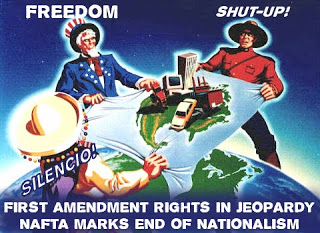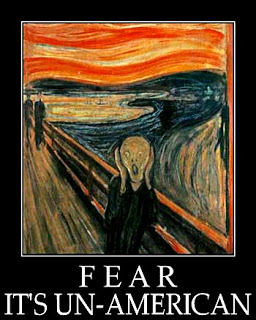AMERICAN JOURNALISTS GAGGED BY LIBEL TOURISTS
The Last Crusade:

LANDMARK CASE BEGINS IN CANADA
FOREIGN LAWS CREATE CLIMATE OF FEAR IN U.S. PUBLISHING AND BROADCASTING BIZ

By Tracy Hood,
No Compromise Media
thelastcrusade.org
American investigative journalist, and author, Dr. Paul L. Williams, will begin his crusade, October 8, in a Toronto courtroom to answer charges of defamation regarding his explosive investigations into missing radio active material at McMaster University in Hamilton, Ontario.
Williams become entangled in a legal jam with the Canadian university while discussing his book The Dunces of Doomsday on the nationally syndicated “Coast-to-Coast AM” radio program with George Noory.
According to Williams, “What is unique about my case is that my alleged violation of Canadian law took place in the U.S.A. I wrote my book in America, where it was published, and I spoke to American reporters who called me at my home in Pennsylvania. By all standards, what I said and wrote about McMaster University remains well within the libel and defamation laws of our land. Still and all, I am being sued by a foreign entity and have lost not only my freedom but my life savings.”
The case is significant since it represents the first time in American History an American journalist has been forced to submit to a foreign jurisdiction. Williams speculates that the reason Canada is able to sue him over the border is because of NAFTA, the North American Free Trade Agreement.
NAFTA was signed into law in 1994 eliminating most trade barriers. However, an unintended consequence of NAFTA was the ability for foreign individuals and entities to sue American journalists and authors on libel and defamation suits much harder to adjudicate in America.
Under Canadian law, once an accusation of libel is made, the respondent must prove they are innocent rather than the plaintiff proving guilt.
“I was asked to sign an apology for remarks I made that came straight from the Congressional Record and testimony by a 9/11 Council, Janice Kephart” Williams stated, “These remarks were verified by several federal investigations and researchers; a host of highly reputable journalists, including Bill Gertz and Scott Wheeler of The Washington Times.”
Foreign citizens or entities suing American journalists in foreign courts for libel and defamation is a growing trend, and as a result Congress is stepping into this issue to fortify free speech protection.
US Citizen, Rachel Ehrenfeld, author, and lecturer was also sued for libel in a British court over her controversial book, Funding Evil. She counter sued stating that under American defamation laws her book was not libelous, but her case was dismissed in a New York court. As a result of her case, the New York legislature passed a law called Rachel’s Law, protecting New York citizens against libel judgements not recognized under American libel jurisprudence.
Senator Arlen Spector (D-PA), alarmed at the increase of libel suits against the American press, has sponsored The Free Speech Protection Act. Spector stated on the Senate floor: “[T]he Free Speech Protection Act of 2009 address[es] a serious challenge to one of the most basic protections in our Constitution. American journalists and academics must have the freedom to investigate, write, speak, and publish about matters of public importance, limited only by the legal standards laid out in our First Amendment jurisprudence.”
Ehrenfeld says, “We need a federal law which allows respondents to counter sue for damages. This law will protect free speech, and be used as a deterrent against foreign lawsuits.”
The House has a similar bill, HR 1304, which would create a “cause of action to determine whether defamation exists under United States law in cases in which defamation actions have been brought in foreign courts against United States persons.”
If you would like more information about this topic, or to schedule an interview with Dr. Paul Williams, please call Tracy at 425.245.3293 or email Tracy at [email protected]
- Rachel's Law
The Last Crusade: DR. HUGH CORT: THE UNSUNG HERO OF THE FREE SPEECH ACT LIBEL TOURISM OUTLAWED OBAMA SIGNS “RACHEL’S LAW” by Paul L. Williams, Ph.D. The [Free] SPEECH Act (Securing the Protection of our Enduring and Established Constitutional...
-
U.S. CONSTITUTION: NOT A CONSERVATIVE VALUE from Michael Travis: Free Speech for Journalists! Please meet Senate staffers on the Hill Feb. 16 2:00 PM re Free Speech Protection Act Please meet Senate staffers in Dirksen 152 this Tues.Feb. 16 at 2:00 PM...
-
CALIFORNIA BECOMES SECOND STATE TO PROTECT AMERICANS FROM FOREIGN LIBEL LAWS byMichael Travis The governor of California, Arnold Schwarzenegger, signed a law yesterday that will protect American journalist and broadcasters from British and foreign libel...
- Op-ed From Dr Paul Williams
Michael Travis sent it over AMERICANS SHOULD NOT BE STRIPPED OF THEIR CONSTITUTIONAL RIGHTS BY FOREIGN COUNTRIES I am a United States citizen on trial in Canada for exposing a situation at McMaster University in Hamilton, Ontario that threatened the...
- Free Speech Under Foreign Assault – By Robert Spencer
from The Last Crusade: By Robert Spencer October 9, 2009 FRONTPAGE MAGAZINE thelastcrusade.org Does the United States Constitution protect the freedom of speech of American citizens, or does it not? In this era of globalization, the answer is becoming...
